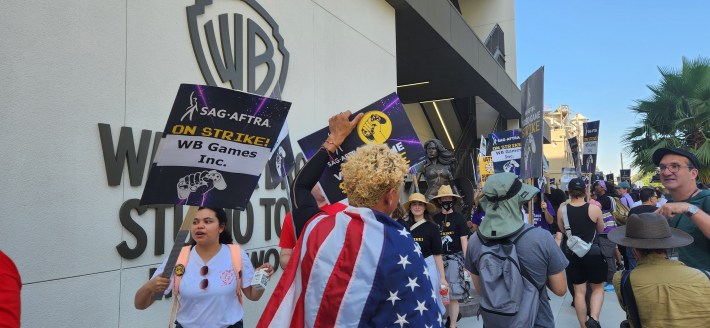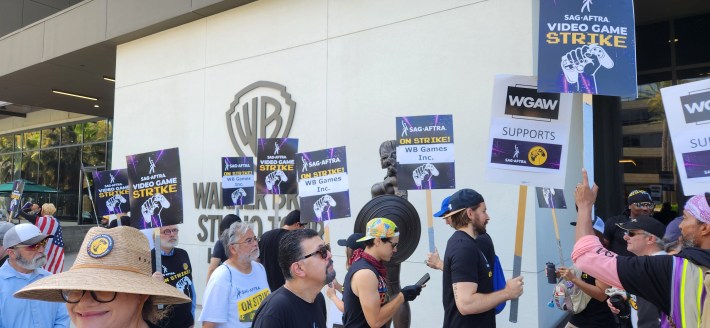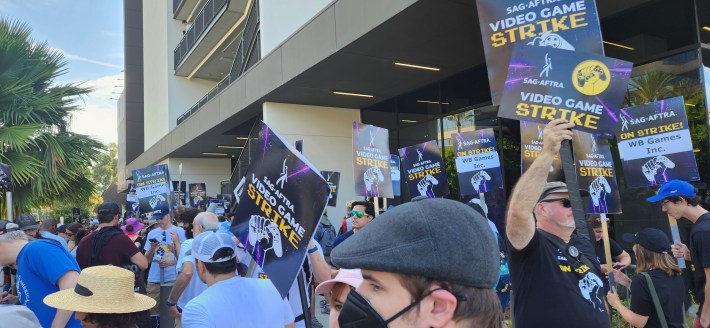Performers across the game industry march across a narrow sidewalk in Burbank on Thursday, looping in a sea of picket signs and black shirts that read “SAG-AFTRA Video Game Strike.” A tent, offering shade and snacks, rotates between playing Ja Rule and Linkin Park as more and more people congregate outside of the Gate 5 entrance to WB Games. By 9 AM, there are already enough people participating in the strike to cause mild congestion; cars honk as traffic piles up along the semi-residential roads. News crews hug the curb as they interview SAG-AFTRA representatives, all squeezed together at the edge of the sidewalk. Police stand at the intersection, watching the strike — a strike that has come about as negotiations between the union and game companies have slowed to a crawl.
Video game performers represented by the Screen Actors Guild-American Federation of Television and Radio Artists (SAG-AFTRA) went on strike on July 25. The union and game companies such as Activision, EA, Take-Two, and WB Games hit an impasse over AI protections for performers, part of negotiations that have gone on for 18 months. Zeke Alton, a member of SAG-AFTRA and an interactive negotiator who has lent his likeness to games such as The Callisto Protocol, says that it has been a long and difficult road. He feels that public support, and support from within the entertainment industry, has been critical in the steps that SAG-AFTRA has made. It just isn’t there yet in terms of a deal.
“We’re looking for protection against the use of generative AI to create synthetic performances to replace us,” Alton told Aftermath, elaborating that this is not an issue unique to video games and pointing to the nursing industry as an example. But Alton feels that performers are the canary in the coal mine: “If we can’t get protection, then it sets a precedent where no one can get protection.”
But Alton remains hopeful. He feels as though unionization at studios like Bethesda and within pockets of Blizzard Entertainment has been a wakeup call. “It’s gotten to a point where people are realizing they can’t just be beaten around by the C-Suite anymore. They’re starting to realize that the ability to maintain a living wage in this country comes from standing together and withholding your work. Not only do developers understand that what we’re asking for is extremely reasonable, but even AI companies themselves agree.”

He spoke positively about SAG-AFTRA’s previous deal with AI firm Replica Studios, which was divisive among union performers. “They [Replica] gave us consent, control, and compensation for both digital replicas and generative AI for synthetic performers. So it seems unreasonable that a few companies in the room are trying to gather all the rights to have the opportunity, should the tech allow, to completely replace us.”
Torian Brackett, a voice actor in Los Angeles, shares a somewhat similar sentiment regarding the deal between SAG-AFTRA and Replica, stating that it seemed to be a good template that would allow voice actors to operate on their own terms. But he feels as though corporations see AI as a “shiny new toy” that they want to use at the expense of their performers. While he doesn’t see generative AI going away any time soon, Brackett believes consumers have a fair amount of power, and that the power of the dollar simply cannot be ignored.
“It's really the consumers that will decide whether, you know, if they'll accept this, and it's going to keep happening,” Brackett said. “But I'm very heartened by what I see in the gaming community. I'm a gamer as well, and people seem, across the board, not interested in hearing AI voices. [Performers] are the people that bring us to tears and elevate the experience we have when we pick up that controller or sit at our keyboard. And they [players] see the value in it. So I hope our bargaining partners will see that same value when it comes to voice acting, when it comes to emotion, when it comes to the entire industry of performance that ties into gaming.”
More than anything, Brackett hopes negotiations end soon and that some kind of agreement will be made and the contract signed. In 2023, film and television actors covered by SAG-AFTRA went on strike for nearly four months, shortly after members of the Writers Guild of America began a nearly five month strike of their own.
Ray Rodriguez, Chief Contracts Officer for SAG-AFTRA, shared that this contract wouldn’t just cover voice actors, but extend further to include performers across the industry. “The strike came to be because we have not been able yet to reach agreement on the protective terms that we need for the use of artificial intelligence involving our members and their performances in video games. So we've been bargaining for 18 months — this contract actually expired in November of 2022, and we started negotiating a month before the expiration of the contract.”

Rodriquez shared that a significant number of video game producers are signatories, but this does not make them staunchly pro-union. “I'm not sure that even all of the people who are assigned to our contract would necessarily describe themselves as pro union. I think they gladly or grudgingly acknowledge the importance of union performers, because they need them to work on their games. And that's their incentive, not necessarily to make a social statement in favor of labor, although we'd love that,” he said.
This hasn’t deterred SAG-AFTRA in their desire to expand their footprint and eventually cover all performers in the video game space. Rodriguez said that this fight is for the entire community, and more broadly, everyone, which seems to be a common sentiment across the board.
“I don't think anybody wants other people to have the right to take your voice and your image and digitally replicate you without your consent and not pay you, and use you in ways that generate profit for multibillion dollar corporations, that's just not a circumstance that I think is tolerable to anyone,” he said. “And I think people really need to see that they have an interest in the outcome of this fight and all the fights that we have had on AI and that we're going to need to have on AI in order to make sure that basic rights like that stay protected.”
This includes the protection of performance capture artists, whose inclusion in AI provisions is at the heart of the strike. As Rodriguez previously told Aftermath, the companies currently want AI protections to extend to performers only if their likeness is recognizable–but, as Rodriquez said to Aftermath in July, “you could be doing the stunts that form the movement for Spider-Man, but what the player is going to see is Spider-Man. So that requirement of identifiability really leaves movement performers out of the scope of coverage."
Jasiri Booker, a performance capture artist who has worked on Insomniac’s Spider-Man 2 and several other projects currently under NDA, said that performance capture artists are represented by SAG’s Interactive Media Agreement, but companies have been using a gray area to hire performance capture artists as non-union. “Because what we do gets animated, it’s not viewed as a true performance,” he said. “As far as the strike and what’s on the negotiating table for us, it’s protection against AI. The ability to be informed and to give our consent if a company does want to train an AI program off of our library of moves, that’s kind of the main big topic for us.”

Seth Allyn Austin, a performance capture artist who has also worked on numerous titles under Insomniac, such as Spider-Man, and several others under NDA, jumped in to share that a lot of this ended up coming to light during the COVID-19 pandemic. “It doesn’t take a whole army of performers like it does for TV or film to create a project; we could go in essentially one at a time and work, but then learn that we still don’t qualify for health insurance because we’re under a non-union contract. And that’s when stuff got real.”
When asked about who he felt was causing negotiations to lag, Austin said that it would be difficult to pinpoint any individual studio. “Video games are an interesting space where you have developers and publishers making games. But the bargaining group of those individual studios can’t come to an agreement to cover us. They won’t come together collectively to give us the protection we want.”
Booker clarified that this strike is not a fight between those looking to unionize and those involved in the hands-on process of making games.“This is not against animators, this is not against designers, this is not against directors. There is this weird invisible ‘they’ that always exists, these kinds of people that have jumped into the video game market during COVID-19 and are now looking for a return on their investment. They’re trying to milk this industry and the performers out there for everything they’re worth and that means, for them, cutting as many people out as possible.”
Austin said that even the more “bread and butter” jobs, such as locomotion, are just as important as more evocative motion capture, and he fears that if those opportunities are taken away, the barrier of entry into performance capture could increase significantly. “When I worked on Spider-Man, I was brought in to flip. But then they [Insomniac] learned that I could act, and my career and my usefulness in that space grew because they gave me that opportunity. And if those simple jobs are taken away, there is going to be an entire generation of performers that won’t have the same opportunities we had.”
Booker and Austin don’t believe that AI could replicate the performances given by actors, or at least not yet. That was something both actors stressed, with Booker believing that those pushing the narrative about this technology and its integration in games don’t understand that it doesn’t, or won’t, work in the way that they believe it does. “AI is a tool and it could be helpful,” Austin said. “But any tool used inappropriately becomes a weapon.”


